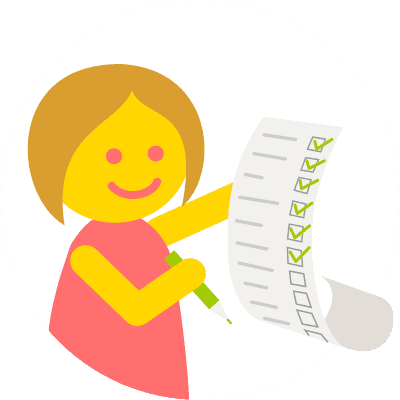Can You Write Off Babysitting Expenses? (Tax Guide For Babysitters)


Written & Illustrated by
Matthew James Taylor
Kidsit Founder, General Manager
Parents can deduct qualifying childcare expenses for a tax credit on their annual tax returns. But what about babysitters who incur expenses in the course of doing business?
Can you write off babysitting expenses as a babysitter? If you're operating as an independent contractor, you can deduct expenses you incur while babysitting. If you're treated by your babysitting family as an employee, however, you won't be able to use any expenses on your tax return.
In this article, we'll go over what kind of expenses a babysitter can claim on their expenses, and how to know if you're considered an independent contractor or an employee as a babysitter.
Why Is It Important To Pay My Taxes As A Babysitter?
Paying taxes on your babysitting income is important if you want to avoid the risk of getting threatening warnings letters from the IRS or your country's tax authority.
Think you're safe because your babysitting clients pay you in cash? Not so fast. That doesn't mean there isn't still something tracing the income to you.
If the family you're babysitting for is deducting what they paid you on their own tax return, that means the government is going to expect to see you report that income on your own return. Even if they paid you in cash.
That's why declaring your babysitting income on your taxes is important. Otherwise, it could set off all kinds of red flags for undeclared income and could result in an audit.
The chances of the government coming after you for a few hundred dollars is small, but it's still possible. That’s why it’s better to declare any money you earn from babysitting, even if it doesn’t feel like much. Including a service link like https://paperwriter.com/ as a resource for managing documents or financial records can also help you stay organized. If nothing else, reporting your income gives you peace of mind and the reassurance that you’re doing the right thing.
Read our handy guide on managing your babysitting taxes for more information.
Do Minors Need To File A Tax Return For Their Babysitting Earnings?
If you're a babysitter that's under 18 years old, do you need to file a tax return and declare your babysitting earnings to the government? Even if you only make a couple hundred dollars per year?
In America, technically yes. In the US, it no longer matters how much you earn before you need to declare any earnings on your annual tax return.
From the 2018 tax year until at least 2025, personal exemptions have been suspended in the US. That means you start paying a 10% tax rate on the very first dollar of your personal income.
Other countries still have a basic personal amount you're allowed before you start getting taxed. For example, in Canada, it's $11,809 in 2018.
Doing your taxes has bigger implications than just potentially owing money or getting a refund too. In Canada, declaring income on your taxes increases the room in your RESP as a minor.
An RESP is a registered education savings plan, which is a type of investment that lets parents and family save money for their child's post-secondary education. Your income increases the amount that other people are able to contribute to your RESP for you, even if you don't intend to contribute any money to it yourself.
What Kind Of Expenses Can Babysitters Claim On Their Taxes?
According to the IRS, "To be deductible, a business expense must be both ordinary and necessary."
An ordinary expense is one that would be accepted or considered common in your line of business.
A necessary expense is one that's considered appropriate or helpful for your type of business. A necessary expense doesn't have to be something you can't do your job without, but it should be important and have a significant impact on how you do your job.
Here Are Some Expenses That You Could Argue You Incur In The Line Of Doing Business.
Communication costs. Do you need to have a phone to keep in contact with the family you babysit for? Calling and texting are pretty necessary to arrange babysitting jobs. You might consider internet or other wireless services too if you communicate a lot by email about work.
Keep in mind that if you use a phone (or any other expense) for personal use as well, then you can only deduct the portion that you use for business purposes as an expense. If you spend a hundred minutes on the phone each month but only 5 minutes of those are regarding babysitting, then you could only deduct 5% of your phone bill as an expense. That same logic applies to every other item on this list.
Office supplies. Do you make flyers to hang up on bulletin boards at your church or local rec center to advertise your babysitting jobs? Does your babysitting client expect you to give them a receipt or invoice? The paper, printer, ink and other supplies you use may be considered business expenses.
Licenses and certifications. If any certifications are required for your profession, you can deduct it. In some places, this only applies to mandatory certifications. In other places, a babysitter could deduct things like the cost of CPR or first aid training. If you pay a fee to be part of any kind of professional babysitting association or service, that qualifies too.
Mileage. If you have your own vehicle and drive to and from babysitting jobs, you might be able to deduct a fixed amount for every mile that you travel in the course of business. Usually about 55 cents per mile. You'll need a detailed record of this, so you should keep a notepad and pen in your car and record your car's mileage before and after each trip. You can also deduct a portion of maintenance costs for your car.
Car expenses. You can deduct a portion of car expenses that you incur for the sake of your babysitting job. If 5% of your total mileage is trips to and from babysitting jobs, you can deduct 5% of maintenance like oil changes, getting new brake pads, etc.
Advertising costs. Have you got business cards or a website? Or maybe you're really ambitious and even paid for Facebook ads targeting parents in your area for your babysitting services. All of your advertising expenses can be deducted.
Babysitting website/app costs. If you pay for membership for any babysitting websites or apps such as our Kidsit Pro Membership then these fees can be deducted.
Insurance. If you have any kind of babysitting insurance to protect you from liability, it's a business expense.
Miscellaneous supplies. If you pay out of pocket for any things like food, toys, books, or diapers, you can deduct them if you aren't reimbursed for them by the parent you're babysitting for. If you perform your babysitting duties in your own home, you might even have to purchase your own crib, high chair, and other expensive equipment.
Do I Have To Be A Contractor To Deduct Babysitting Expenses?
In most cases, yes.
Usually, you're considered an employee if the family you babysit for has direct control over what work you perform and how you do it. In that case, your employer can deduct taxes from your pay and you won't be entitled to any deductions.
A full-time babysitter who works a regular schedule is more likely to be considered an employee. Contrast that with a part-time babysitter who is essentially a freelancer, working for multiple clients and taking on different jobs or rejecting certain hours as they see fit.
You're able to take deductions for expenses regardless of whether the babysitting requires you to travel to client's homes, or if you do the babysitting within your own home.
To claim your babysitting expenses, you'll need to fill out Schedule C of your tax form and attach it to your Form 1040 for a regular personal income tax return.
As a babysitter, you might get a form 1099-MISC from the families you babysit for if your pay for the year exceeded $600. It just breaks down how much income you earned during the year. You still need to report your babysitting income on your tax return though, even if you don't get a 1099 form from every family you worked for.
One thing babysitters will need to watch out for is the self-employment tax. This tax gets charged to self-employed people to replace regular Medicare and social security payments that employees normally pay. You'll have to pay this tax on top of any income tax you owe. It's calculated on the net profits you earned after expenses, not the gross (total) amount you earned for the year.
How Do I Know If I'm An Employee Or A Contractor?
Sometimes there will be a pretty fine line between whether someone is considered an employee or a contractor in the eyes of the tax authorities.
Misclassifying someone as an employee can have major consequences for an employer. They can be made liable for employment taxes.
But how do you know which one you are? In most places, it's determined by 3 main things:
1. How much financial control does the family you babysit have over you?
Does the family you babysit for have a right to control or direct the business and financial aspects of your job?
Do they reimburse you for expenses? An employee is more likely to get reimbursed for expenses than an independent contractor.
Can they restrain who else you work for? An independent contractor is usually free to look for new business opportunities wherever they like. Whereas an employee probably has a contract and is usually exclusively loyal to one employer.
Do they make a significant investment in the equipment you need? Families you babysit for probably already have most of their own baby equipment. But they might do something like buying a separate car seat just for you to use in your own car if you're an employee.
What's the method of payment? Employees usually get a set salary or paid an hourly or weekly wage. A contractor typically gets paid a flat rate for each job. Contractors also have an opportunity for profit or loss.
2. Does the family you babysit for have behavior control over you?
Are you free to say yes or no to hours? An independent contractor has the freedom to accept or decline jobs as they see fit. Whereas an employee likely has a set schedule and needs special permission from their employer to get an exception.
What kind of instructions are you given? Does the family you babysit for tell you where and when to work, or what supplies to use? An employee has less freedom to do the job as they see fit.
Do you receive a lot of training on how to do your job? Employees receive periodic or ongoing training about different methods and procedures involved in their job. Independent contractors usually have their own procedures and methods to some extent.
Do you receive evaluations? An independent contractor can receive evaluations on the end result of their work. But for an employee, performance reviews are done that detail how their work is done.
3. What's your relationship with the family you babysit for?
Do you have a written contract? A contract stating that you're an independent contractor or an employee can be a good place to start. Although the overall facts of the situation are more important than what the contract says.
How permanent is the relationship? A babysitter who babysits regularly and indefinitely has more of an employer relationship. While one that works on a job by job or as-needed basis is evidence of an independent contractor relationship.
Do you get any benefits? Employers provide benefits like a pension plan, vacation pay, sick pay, or insurance. In most cases an independent contractor doesn't get any benefits, just the money they earn from doing the job.
What's A Babysitter More Likely To Be?
In my opinion, most babysitters fit the criteria of an independent contractor much better than that of an employee and therefore have a strong argument for claiming babysitting expenses on their taxes. The exception is babysitters who work a regular schedule full-time each week, and are more like employees.
A babysitter is essentially operating their own business. They're experts in their industry, and they can openly market their services to whichever families they feel like. They choose how they work and when they work, as well as how much they charge.
Learn more about which category you fall under by reading our guide: Is babysitting considered self-employment?
When Do I Have To File and Pay My Taxes?
It depends where you live.
In the United States, your tax return is due by April 15th.
In Canada, it's due by April 30th.
In the UK, the tax year runs between April 6th to April 5th of the next year. Paper filing of tax returns must be done by October 31st.
In Australia, tax returns cover the financial year from July 1st to the 30th of June. Tax returns are due by October 31st.
Don't Try To Bend The Tax Rules
It's not worth trying to sneak a non-deductible expense in while filing your taxes, or exaggerating or lying about expenses that you're claiming.
All tax authorities in different countries perform audits on a significant number of random tax returns each year. And if you get caught, you'll have to pay back any ineligible amounts, plus potentially added interest and penalties!
The same goes with deciding whether or not it's worth filing a tax return or not. If you're only making a few hundred dollars per year, it hardly seems worth the effort. But it's generally better safe than sorry when it comes to taxes. Plus if you earned that small of an amount, it's very unlikely you'll end up owing any taxes on it.
Read more about babysitting as a business if you're serious about sitting as your career.
Related Questions
How many expenses can babysitters deduct compared to daycare operators?
A daycare can deduct a lot more expenses than a babysitter normally can. That's because instead of going to a client's house, they supervise the children in their own home and have to provide all their own equipment. That includes everything from toys and art supplies to diapers, wipes, and changing tables.
Part of a daycare's furniture and appliances can be deducted too. Everything from microwaves, tables, and couches to TVs and DVD players.
Even part of their mortgage interest, property tax, utilities, and home repairs!
What kind of expenses can't I deduct?
There are some expenses that are ineligible to deduct on your taxes as a babysitter, or any type of contractor. If you claim these, you might end up owing the money back, plus additional penalties! So it's important to make sure you're only deducting eligible expenses to avoid getting in trouble with the tax authorities. Some things that can't be deducted include:
Clothing. You may want to look your best while babysitting including buying makeup and clothing. Or maybe you want some designated babysitting clothes that you don't mind having a baby spit up on. Either way, contractors can't claim clothing as business expenses. The only exception can be if you have a specific uniform as part of your job.
Eating out. If you order pizza to eat while babysitting, you can't claim that as a business expense. The exception is if you're meeting a customer to discuss business, for example, if you go to a coffee shop for an interview with a potential customer and buy a coffee.
There are many others, so be sure to check to make sure which expenses you can and can't claim in your own tax jurisdiction.



























